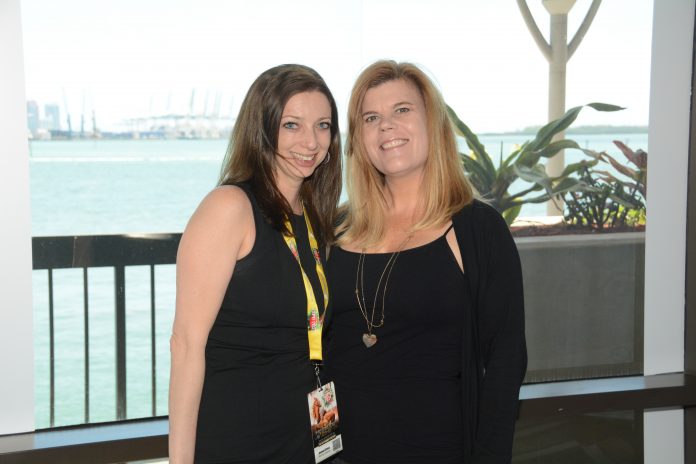(Note: This story appears in the July 2021 issue of ED Magazine)
Social media isn’t going anywhere — which means if you aren’t adept at juggling your various platforms (you don’t have only one, do you?), you might be left out in the marketing lurch. At EXPO 2021, Adella of Forward Approach Marketing & Jenna Gross of Moving Targets gave specific advice for your club’s social media marketing on Instagram and Facebook.
Back in 2012, Facebook acquired Instagram for a cool $1 billion and promised to keep it operating independently. As we near the 10-year-anniversary of that acquisition, Facebook and Instagram have maintained their breakneck technological pace, even as new threats emerge to try and topple them (looking at you, TikTok).
So, it stands to reason that if you want to get potential customers’ eyeballs drawn to your club, it can’t hurt to attempt to entice those eyeballs already glued to Facebook and Instagram feeds. That was precisely the topic at the “Regroup” seminar where two experts — Adella from Forward Approach Marketing and Jenna Gross of Moving Targets — provided key tips and advice on managing and maximizing your Facebook and Instagram accounts.
Adella on Instagram
Adella led off the seminar by walking through the steps of how to present a professional Instagram account. She started with an account’s “handle” (the name of your account) and bio. She pointed out how your bio should reflect the name of your club (which may be different from a handle if it’s already claimed), your product, missive, as well as special contact info, hours, as well as a link that can lead to more information (such as entertainers due in the club in the future).
It doesn’t necessarily have to be the club owner or a high- ranking executive that’s in charge of Instagram, but Adella said it should definitely be a trusted party.
“If it’s someone who works inside your club, they can develop relationships with not only the customers but also with your performers,” said Adella, who has been doing marketing in the adult entertainment industry for 25 years. “Somebody that has creative and artistic aspirations.”
“Your audience is going to know if you’re trying to sell them something, or if you’re giving them value. Your posts don’t need to be market-y. They need to add value to your customer and to your audience.” — Adella
She also stressed setting up all social media accounts with email addresses that can be controlled and accessed. “Should there ever be a falling out, you will be able to get your Instagram profile back,” she said “That’s very, very important. You want to stay in control.”
As far as content itself for Instagram, which is a highly visual medium, it should reflect your club with original videos and images.
“Before you take photos or post anything, you always want to check with your entertainers to make sure they are comfortable being featured,” she cautioned. “On Instagram, you want to keep it safe for work. It’s not as lenient as Twitter, and you don’t want to lose your account. Try to try to keep it covered as much as you can, but still keeping it sexy.”
But don’t consider this a “sell” job.
“Your audience is going to know if you’re trying to sell them something, or if you’re giving them value,” Adella said. “Your posts don’t need to be market-y. They need to add value to your customer and to your audience.”

Timing and time management are also critical areas to monitor when it comes to Instagram. Adella advised posting to your Instagram account at least once a day — while experimenting with several different times — to see what posts gain the most traction. Being that consistently creative can be exhausting, so if you can gain consent, you can share content from your staff or entertainers. She also recommended creating your basic content in a two-to- three-hour window one day and spreading it out throughout the week with the assistance of automated social media programs, such as Hootsuite or Sprout Social.
One of the last arenas to win the Instagram battle is hashtags, which are used to identify a place, mood, theme, subject (e.g. #EXPO2021, #Miami, #Miaminightlife).
“Hashtags are a great way to expand your audience,” she said. “Using relevant, targeted hashtags on your posts and stories is the best way to get discovered by new audiences. And this can translate into more engagement, more followers, and more customers for your business.”
“Instagram allows you to use 30 hashtags, and there’s no reason why you shouldn’t,” echoed ED Associate Publisher Dave Manack, the semianr’s moderator. “Hashtags are kind of like throwing out a fishing line, and each hashtags is like casting your line. And each hashtag gives you an opportunity to reach a potential audience, because some people will go on Instagram and search for content via hashtags. They don’t necessarily search your venue or another venue, they actually are searching hashtags. But they have to be somewhat peripheral. You can’t just like grab random hashtags, that’s not gonna work for you, so you have to have a strategy.”
Jenna Gross on Facebook
Luckily, as Instagram is owned by Facebook and they’re both social media platforms, there is some crossover between approaching both. “It is good to be on both because you want to appeal to as many people as possible, and make sure you’re not missing anyone,” said Gross, who has been featured at previous EXPOs for her social media expertise.
Like with Instagram, consistency is a must for quantifiable Facebook success. “That’s one of the biggest things we always see on any platform, is somebody will have a post on their page from three years ago. Especially now, post-COVID, with so many businesses closed, if you don’t consistently post, even once a week, people think you’re closed,” said Gross. “That’s never a good look.”

While Instagram is renowned for its visual appeal, Facebook also has a lot of added features over Instagram, such as polls, job postings, and a marketplace to sell tickets (or VIP packages). New settings even permit automated Facebook responses (such as to the ever-pressing ‘Are you open?’ inquiry) and administrator (aka you) approval before an internal post can go live. Automated responses may be a luxury to save time, but they are a key to maintaining engagement with customers, existing and prospective.
One of the questions was about responding to online activity after a party or event has happened.
“I think that’s way more important than posting,” said Gross, “because otherwise you’re just ignoring people. Ignoring people isn’t a good look for customers.” Both platforms also enable direct messaging, which can be a benefit to clubs for a more personal effect.
“That’s one of the biggest things we always see on any platform, is somebody will have a post on their page from three years ago. Especially now, post-COVID, with so many businesses closed, if you don’t consistently post, even once a week, people think you’re closed. That’s never a good look.” — Jenna
Adella concurred, “If somebody takes the time to say anything on your page, comment or send you a direct message, respond as quickly as you can. It doesn’t have to be long. It shows you’re active, you care and you’re interested. It makes them feel important.”
Social media has long ditched the title of “fad.” It’s a part of everyday life and as such, it’s imperative to embrace it and what it can do you for your club.
“The real reason that people are on social media, any platform, is to connect,” says Gross. “People come to clubs for different reasons — whether it be looking for a fun night out, somebody to talk to, whatever it is — the more you vary your social media content, the better you can reach all those different people that are looking for different experiences, and actually give them a reason to come into your club.”





























